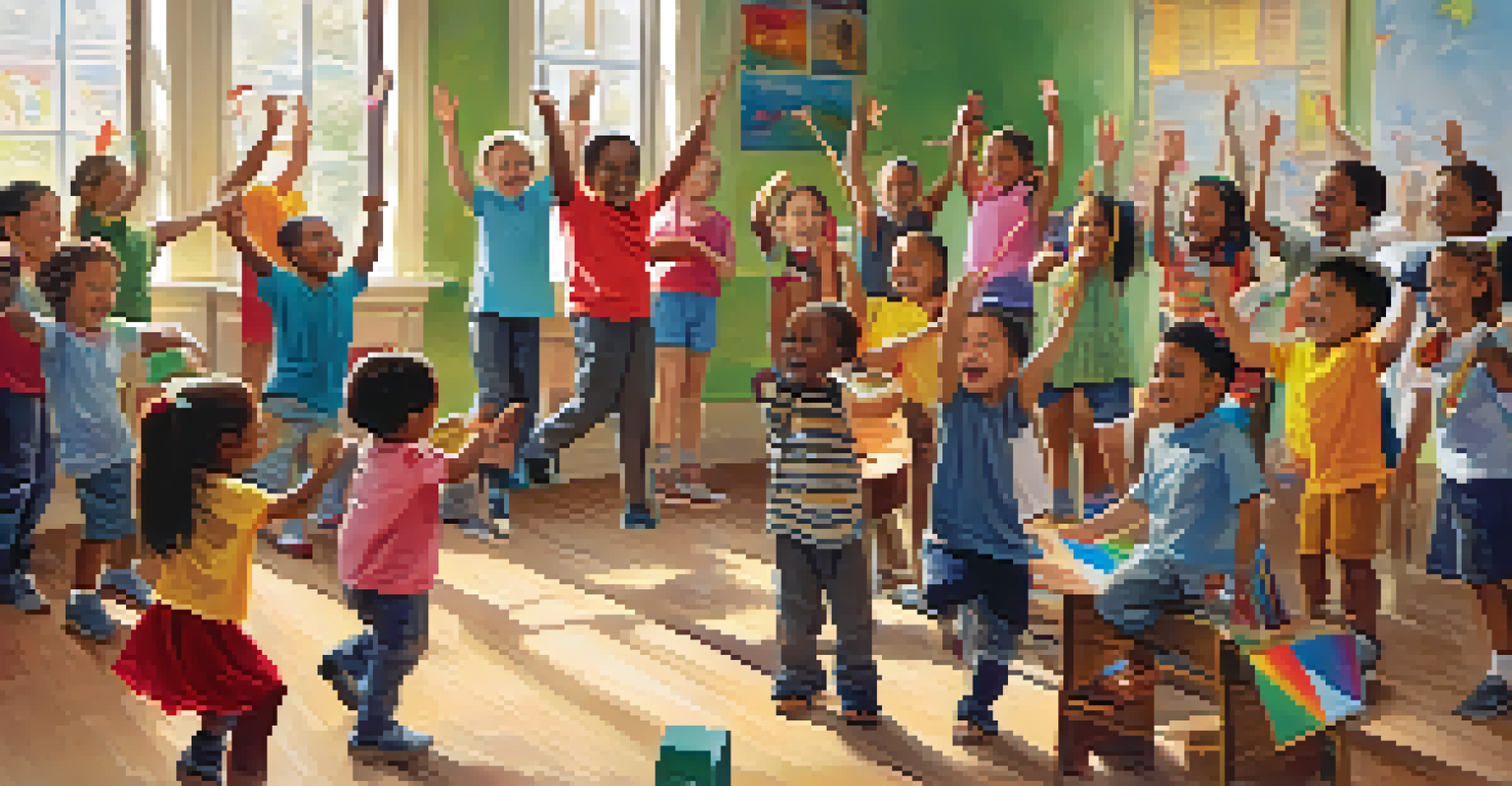Music and Brain Development: A Child's Perspective

Understanding Brain Development in Children
Child brain development is a fascinating journey, akin to planting a garden. Just as seeds need sunlight and water to grow, children's brains thrive on various stimuli, including music. This early stage of life is crucial as the brain forms connections and pathways that shape future learning and behavior.
Music can change the world because it can change people.
During the first few years, a child's brain connects more than a million synapses each second, making it incredibly receptive to new experiences. Music plays a vital role in this process, providing a rich auditory environment that can enhance cognitive functions. Through exposure to melodies and rhythms, children develop essential skills such as memory, attention, and even emotional regulation.
Research suggests that engaging with music can lead to structural changes in the brain. For instance, children who participate in musical activities often show increased gray matter volume in areas related to auditory processing and coordination. This connection between music and brain development highlights the importance of incorporating musical experiences into a child's daily life.
How Music Enhances Cognitive Skills
Music isn't just enjoyable; it's also a powerful tool for boosting cognitive skills in children. Think of it as a workout for the brain, where different aspects of music—like rhythm, melody, and harmony—help strengthen various cognitive abilities. For example, learning to play an instrument can improve memory and concentration, much like practicing a sport enhances physical skills.

When children engage with music, they often develop better language skills, as both music and language share similar brain pathways. Singing songs, for instance, helps with phonetic awareness, which is essential for reading. This interplay between music and language underscores how musical exposure can lay a strong foundation for literacy.
Music Boosts Cognitive Skills
Engaging with music enhances children's memory, concentration, and language abilities, laying a strong foundation for literacy.
Moreover, music can improve problem-solving skills. When children learn to play an instrument or understand musical patterns, they practice critical thinking and spatial-temporal skills, which are important for subjects like math and science. By integrating music into their lives, kids can unlock a wealth of cognitive benefits that support overall learning.
The Emotional Benefits of Music for Children
Music is more than just sound; it's a powerful emotional tool that can help children navigate their feelings. Just like a favorite childhood song can evoke memories, music can help children express and understand their emotions. This emotional connection to music is crucial for developing empathy and emotional intelligence.
The music can bring people together, and it can help them understand each other better.
For instance, when children listen to or create music, they often find a safe space to explore their feelings. Whether it's joy from a lively tune or comfort from a soothing melody, music provides an outlet for self-expression. This ability to process emotions through music can lead to healthier emotional regulation as they grow.
Furthermore, engaging with music can foster social connections. Group activities, such as singing in a choir or playing in a band, encourage teamwork and collaboration. These experiences not only enhance musical skills but also promote social development, helping children build relationships and learn important social cues.
Music and Motor Skills Development
Did you know that music can also aid in developing motor skills? Just as a dance class can get kids moving, engaging with music often involves physical activity that enhances coordination and fine motor skills. This physical interaction with music, whether clapping to a beat or playing instruments, plays a significant role in overall motor development.
For example, learning to play an instrument requires precise finger movements, which can improve dexterity. Activities like drumming can enhance hand-eye coordination, as children learn to synchronize their movements with rhythmic patterns. These skills are not only crucial for musical performance but also translate into everyday tasks.
Music Develops Emotional Intelligence
Music helps children understand and express their emotions, fostering empathy and social connections through shared musical experiences.
Moreover, music can motivate children to be more active. Upbeat songs can energize their playtime, while rhythmic activities like dancing promote physical fitness. By blending music with movement, children can develop healthy habits that support both their physical and cognitive growth.
The Role of Music in Language Acquisition
Music and language are deeply intertwined, acting like two sides of the same coin. For young children, exposure to music can significantly enhance language acquisition by improving listening skills and phonetic awareness. This connection is particularly evident in how children learn to distinguish sounds and rhythms, which are foundational elements of language.
When children sing songs or listen to rhymes, they become more attuned to the nuances of language. This practice helps them recognize patterns in speech, making it easier to learn new words and phrases. Additionally, interactive musical experiences—like clapping along to lyrics—encourage participation, further reinforcing their language skills.
Furthermore, musical storytelling can introduce new vocabulary in an engaging way. As children listen to stories set to music, they not only enjoy the narrative but also absorb new words and concepts. This playful approach to language learning fosters a love for reading and communication, setting the stage for lifelong literacy.
Music as a Tool for Cultural Awareness
Music is a universal language that transcends cultural boundaries, offering children a window into diverse traditions. By exposing children to different musical styles, they can develop a greater understanding and appreciation for various cultures. This exposure fosters open-mindedness and curiosity about the world around them.
For instance, listening to folk music from different countries can spark conversations about cultural practices and history. Learning traditional dances associated with specific music styles can also provide insight into the values and beliefs of those cultures. This blend of music and cultural education enriches a child's worldview.
Music Enhances Motor Skills
Physical activities related to music, such as dancing or playing instruments, improve children's coordination and fine motor skills.
Moreover, participating in multicultural music activities can promote inclusivity and empathy. Children learn to celebrate differences while finding common ground through shared musical experiences. As they explore the rich tapestry of global music, they become more culturally aware individuals, ready to embrace diversity.
Encouraging Music Engagement at Home
Incorporating music into your child's daily routine doesn't have to be complicated; it can be as simple as singing during bath time or playing their favorite tunes during family meals. These small moments can make a big difference in their musical exposure. Think of it as adding a sprinkle of joy to everyday activities.
Creating a musical environment can also involve providing access to various instruments. Even simple items like pots and pans can become percussion instruments in your kitchen band! Encouraging children to experiment with sounds fosters creativity and can lead to a lifelong love of music.

Additionally, consider enrolling them in music classes or community programs. These structured environments allow children to learn from professionals, meet peers, and experience music in a fun way. By nurturing their musical interests, you're not only enriching their lives but also supporting their overall development.